Faith and Politics
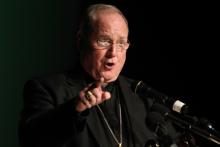
NEW YORK — Walk the streets of Manhattan, especially around St. Patrick’s Cathedral, and ask passersby about Cardinal Timothy Dolan and two things stand out: one, they know who you’re talking about, and two, they like him. Often love him.
Both responses are unusual in the U.S. today: generally, Catholic churchmen are either interchangeable faces to the public, or, if they are known, it’s because of an unflattering headline.
Now Dolan’s extraordinary visibility and popularity are being cited as factors that could make him the first American with a realistic shot at being elected pope when the College of Cardinals gathers in March to elect a successor to Benedict XVI.
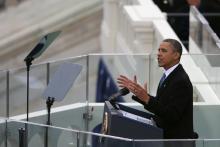
"Lincoln’s writings speak to me ... that though we may have our differences, we are one people, and we are one nation, united by a common creed. ... Lincoln saw beyond the bloodshed and division. He saw us not only as we were, but as we might be." - President Barack Obama
"We are confronted with the fierce urgency of now. …Over the bleached bones and jumbled residue of numerous civilizations are written the pathetic words: 'Too late.'" -Martin Luther King, Jr.
Dear President Obama,
Your words above aptly describe the greatness of Abraham Lincoln. Slavery was the moral crisis of his time, and because he fervently believed "we are one people," he took a stance which initially led to much adversity. But he rose to the challenge and the rest is history.
In a speech to Congress in 1862, Lincoln said: "The dogmas of the quiet past are inadequate to the stormy present. The occasion is piled high with difficulty and we must rise with the occasion. As our case is new, so we must think anew and act anew."
Circumstances have conspired to place you at the presidential helm during a moment of unprecedented global crisis. Last year, we saw one of the most prominent features of our planet — as seen from space — altered beyond recognition. A huge portion of the snow and ice white of the Arctic was simply, and stunningly, gone.
"I urge lawmakers to press for comprehensive and universal background checks for firearm ownership, regardless of where and how a gun is purchased; for bans on the availability to civilians of assault rifles and high-capacity magazines; and for policies designed to better regulate the manufacture of guns,” the Presiding Bishop states in her testimony. “The Episcopal Church also supports the highest level of accountability for violation of all existing laws pertaining to violence in our midst.”
IN A CROWDED auditorium [in Honduras after Hurricane Mitch] that served as a shelter for 900 people, the scarce supply of drinking water was kept in a bucket and labeled with a sign that said "Do not use your own cup." Five bored, mischievous children, however, could think of nothing better than to try to stick their cups in the water. Then one relief worker gave them a special assignment. "This water is very important," she said. "I need you to be the guardians of the water so that no one dips in their own glass." And they, feeling respected and needed, became the fierce, undaunted protectors of the water supply.
Similarly, countless Hondurans are saying, "If not us, then who?"—righting their relationship with themselves, assuming the task of rebuilding their homes and communities, recognizing that progress occurs when they participate. Women, who have never even valued their never-ending activity as work, are speaking up when the pay sheets are evaluated. "I planted a garden. I rebuilt the wall of my house. I earned my corn and beans."
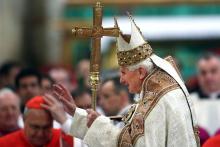
Pope Benedict XVI announced today he will step down on Feb. 28, citing his advanced age. The head of the Catholic Church is 85 years old. Below is the text of his announcement.
Dear Brothers,
I have convoked you to this Consistory, not only for the three canonizations, but also to communicate to you a decision of great importance for the life of the Church. After having repeatedly examined my conscience before God, I have come to the certainty that my strengths, due to an advanced age, are no longer suited to an adequate exercise of the Petrine ministry. I am well aware that this ministry, due to its essential spiritual nature, must be carried out not only with words and deeds, but no less with prayer and suffering. However, in today's world, subject to so many rapid changes and shaken by questions of deep relevance for the life of faith, in order to govern the bark of Saint Peter and proclaim the Gospel, both strength of mind and body are necessary, strength which in the last few months, has deteriorated in me to the extent that I have had to recognize my incapacity to adequately fulfill the ministry entrusted to me. For this reason, and well aware of the seriousness of this act, with full freedom I declare that I renounce the ministry of Bishop of Rome, Successor of Saint Peter, entrusted to me by the Cardinals on 19 April 2005, in such a way, that as from 28 February 2013, at 20:00 hours, the See of Rome, the See of Saint Peter, will be vacant and a Conclave to elect the new Supreme Pontiff will have to be convoked by those whose competence it is.
Dear Brothers, I thank you most sincerely for all the love and work with which you have supported me in my ministry and I ask pardon for all my defects. And now, let us entrust the Holy Church to the care of Our Supreme Pastor, Our Lord Jesus Christ, and implore his holy Mother Mary, so that she may assist the Cardinal Fathers with her maternal solicitude, in electing a new Supreme Pontiff. With regard to myself, I wish to also devotedly serve the Holy Church of God in the future through a life dedicated to prayer.
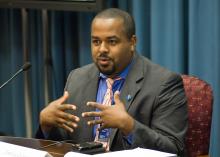
Joshua DuBois has been running the Office of Faith-Based and Neighborhood Partnerships for President Obama for the past four years, but he leaves the White House today. That Joshua’s farewell party had to be moved to a larger location is just one sign of the respect and affection he earned during Obama’s first term. The President especially appreciated his young spiritual adviser, and read devotional biblical reflections from DuBois every day. At yesterday’s National Prayer Breakfast, President Obama lifted up Joshua’s importance to him and his administration, and said how much the young African-American Pentecostal pastor would be missed; the applause from the audience demonstrated the president wasn’t alone.
I have worked closely with Joshua, and want to wish him my own grateful farewell. I’ve watched this young man grow into this important job. He has been a good listener, facilitator, encourager, and convener; and has worked hard to put faith-based offices in executive departments throughout the administration — a first for any White House. Over the course of the last four years, Joshua has been successful because people both trust and like him, and the farewell comments at his going away party will show that. Joshua has especially worked hard to connect outside faith leaders and the faith-based community to key places and players in the White House to move agendas that we care about forward.

The nation’s Catholic bishops on Thursday rejected the Obama administration’s latest proposals to broaden accommodations for religious groups in regulations that require insurance companies or employers to provide free birth control coverage.
The administration last week released a long-awaited compromise for faith-based employers that have religious objections to offering health insurance that could be used by employees to access contraceptives and sterilization.
Yielding to demands by the bishops and other critics, the new accommodation contained a more expansive definition of what constitutes a religious group.
It also detailed how faith-based institutions that may not be exempt – especially religiously affiliated hospitals and universities – would be shielded from any involvement in providing contraceptive coverage; under the new rules, the insurance companies themselves would arrange that with the individual employee.
But New York Cardinal Timothy Dolan, president of the U.S. Conference of Catholic Bishops, said the proposals fail to address or ease all of the hierarchy’s concerns, and said the bishops would continue to press ahead with efforts to overturn the mandate in court.

WASHINGTON — Longtime White House aide Joshua DuBois, who heads the White House office focused on the intersection of religion and public policy, will step down on Friday, President Obama announced Thursday.
Obama, speaking at the National Prayer Breakfast, asked DuBois to lead his White House Office of Faith-based and Neighborhood Partnerships in 2009 when the Pentecostal reverend was 26, and hoped DuBois could sustain the ties he had helped forge between Obama and religious groups during the 2008 presidential campaign.
DuBois will teach at New York University starting later in the year, according to White House officials, and also plans to write a book based on the inspirational messages he sent to Obama daily.
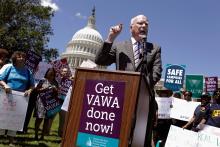
As much as we like to believe we live in a safe country for women, we know this is not the case. Women and girls across the country are subject to rape, abuse, intimidation, and sex trafficking, with the number of victims growing each day.
Progress has been made over the past decades, thanks in part to the Violence Against Women Act. This policy protects women by providing everything from funding for rape crisis centers to increased collaboration with law enforcement to hold perpetrators accountable. VAWA is our country’s promise to women and girls that we will not allow them to be violated and abused.
The Violence Against Women Act is up for a vote in the Senate next week, and Americans from every corner of the country are calling our policymakers to reauthorize this important legislation. Since it was first passed in 1994, VAWA has received strong bipartisan support and shown its effectiveness in making communities safer, healthier, and better stewards of their resources (in the first 6 years since it was introduced, VAWA saved communities $12.6 billion).
VAWA expired in 2011, and has yet to be reauthorized.
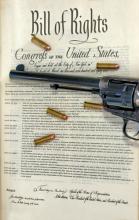
How did this gun-owner-since-he-was-eight find himself at a prayer vigil to end gun violence on the steps of the Michigan state capitol? The easy answer is that Michigan Prophetic Voices, a nonpartisan, statewide organizing clergy group invited me to be there. But I had another reason.
In my family owning a gun was explained as a rite of passage, not as a Second Amendment right. When my father handed me my first gun he said, "You are old enough now to learn how to use this safely. There is one thing you have to promise me: never point it at anyone. If you do, I will take it away for good." I made the promise.
The man who said those words had heard different words from his father. "Never steal another man's property," my grandfather had told my dad, "and if it's yours, you fight like hell to keep it."
Those words shaped events of an early August morning in the 1970s when both of those men leveled shotguns at would-be burglars in the family business and, out of fear for their own lives, fired. One of those 20-something men was killed.

Invoking once again the spirits of Lincoln and Dr. King — and reemphasizing his own personal faith — President Barack Obama called for humility and a focus on common ground in his remarks at today’s National Prayer Breakfast at the Washington Hilton.
Citing the divisions that exist in Washington, Obama said our charge as citizens, and as leaders in government, is “to find the common ground that allows for us as a nation, as a people, to take real and meaningful action,” he said.
He reflected on the humility shown by Abraham Lincoln and Dr. Martin Luther King, Jr., who both turned to their bibles — both of which Obama used at his swearing-in ceremony last month — finding solace in the words of scripture amid the divisions of their times.
Obama recalled his own reflection and study, saying he often searches scripture to figure out “how to be a better man as well as a better president.” His words build on previous allusions to his personal faith journey. He has always insisted that doubt is part of faith, but faith comes with constant seeking.
“Faith is something that must be cultivated. Faith is not a possession. Faith is a process,” the president said, adding later that, “While God may reveal his plan to us in portions, the expanse of his plan is for God and God alone to understand.”

It was the biggest story inside the Beltway. Since last Thursday’s hearing, the whole Washington media machine has been discussing and dissecting the extraordinary confrontation in the Senate Armed Service Committee regarding the potential confirmation of former Sen. Chuck Hagel as the new Secretary of Defense. Several Republican senators were extremely combative with the combat veteran who earned two Purple Hearts for his wounds in Vietnam. Hagel deserves another Purple Heart for the wounds his former “friends” and party members tried to inflict upon him. Hagel didn’t really defend his views — which were both caricatured and attacked by his adversaries — perhaps on White House advice not risk further debates before being confirmed.
But I think Hagel’s views and the important questions he has raised about current U.S. wars and military policy deserve defending and, indeed, should become the subjects of a national debate. So I wrote a piece about one of Hagel’s most hostile questioners who insisted the possible new Secretary answer the simple question of whether the surge in Iraq was “right” or “wrong.” I said it was wrong, as was the war in Iraq, as was the war in Vietnam, as are the views of John McCain on war throughout his entire political career; and how the nation has been wounded by McCain’s and others’ “theology of war.”
Chuck Hagel’s views could lead us to a necessary national debate if he becomes the new leader of the Pentagon. And it is that potential debate that Hagel’s critics are so afraid to have.
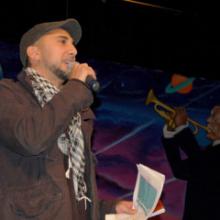
CHICAGO — Religious affiliation may be on the wane in America, a recent Pew study asserts, but you wouldn’t know it walking into the storefront near the corner of West 63rd Street and South Fairfield Avenue.
Inside a former bank in a neighborhood afflicted with gang violence, failed businesses and empty lots, a team of volunteers drawn by their religious faith is working to make life better for Chicago’s poorest residents.
The free medical clinic has expanded its hours; 20-something college graduates are clamoring to get into its internship program; rap stars swing by its alcohol-free poetry slams; and the budget has increased tenfold in the past decade.
The storefront belongs to Chicago’s Inner-City Muslim Action Network (IMAN) and it is part of a wave of new Muslim institutions emerging at an unprecedented pace. More than a quarter of the nation’s 2,106 mosques were founded in the last decade, according to a recent University of Kentucky study, and new social service organizations, many of them run by 20- and 30-something American-born Muslims, are thriving as never before.
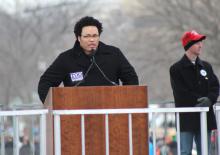
WASHINGTON — Standing before the throngs at the March for Life on Jan. 25, Ryan Bomberger admitted that he was the poster child for one of the most difficult aspects of the abortion debate: his mother had been raped.
“I’m the fringe case that even pro-lifers have a hard time embracing,” said Bomberger, an anti-abortion activist whose mother chose to continue the pregnancy and put him up for adoption.
Forty years after the Roe v. Wade decision legalized abortion, children who were conceived through rape — and women who were raped and chose to end the pregnancy — are speaking out, opening a new front in the often-fraught discussions of a decades-old culture war.

The Obama administration on Friday sought to placate religious groups by broadening religious exemptions and giving faith-based organizations more room to maneuver around its controversial contraception mandate, but the new rules offer no loopholes for privately owned businesses.
The contraception mandate, part of Obama’s health care overhaul, had set off an explosive church-state dispute and soured relations between the White House and some Christian groups, including the Catholic bishops’ conference.
The new rules, issued by the Health and Human Services Department, seek to address religious freedom concerns in two ways: First, they broaden the definition of “religious employers” so that all houses of worship and dioceses and affiliated organizations will be clearly exempt. Second, for other faith-based employers, the rules would transfer the costs and administrative tasks of the birth control insurance policies to insurance companies.
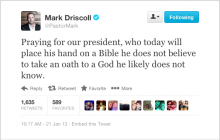
Rev. Mark Driscoll, founder of Mars Hill church, has a true gift. Just when I think I’m making at least a modicum of progress toward tolerance – if not actual Christlike love – toward the guy, inevitably he does something to make me despise him all over again.
On the Monday, before President Obama’s inauguration ceremony, Driscoll sent out the following message to his more than 300,000 Twitter followers:
Praying for our president, who today will place his hand on a Bible he does not believe to take an oath to a God he likely does not know.
As of Thursday morning, the tweet has received more than 3,400 retweets and nearly 1,350 favorites. Driscoll’s next tweet was about an iPad Mini giveaway.

In the past 20 years, the world has witnessed the death of social contracts. We have seen a massive breakdown in trust between citizens, their economies, and their governments. In our own country, we can point to years of data painting a bleak picture of the confidence Americans have in any of our traditional institutions.
Former assumptions and shared notions about fairness, agreements, reciprocity, mutual benefits, social values, and expected futures have all but disappeared. The collapse of financial systems and the resulting economic crisis not only have caused instability, insecurity, and human pain; they have also generated a growing disbelief and fundamental distrust in the way things operate and how decisions are made.
This week at the World Economic Forum in Davos, Switzerland, we are looking to the future and asking “what now?” At a Saturday session — “The Moral Economy: From Social Contract to Social Covenant” — a document will kick off a year-long global conversation about a new “social covenant” between citizens, governments, and businesses.
This is really “a call” for worldwide discussion about what values are needed to address the many difficult challenges and choices the world is now facing. Inequality, austerity, retrenchment, constraints, mal-distribution, growing conflicts over resources, and extreme poverty all raise questions about our values.
Evangelicals haven't always been part of the pro-life coalition. Prior to Roe v. Wade in 1973, the Southern Baptist Convention passed a resolution supporting abortion in certain circumstances. After Roe allowed any abortion for any reason, evangelicals began to change their stance and with Catholics formed the pro-life coalition we know today. The Washington Post reports:
The reality of abortion on demand and exposure to the logic of the abortion rights movement led to a fundamental shift in the evangelical conscience. By 1976 the Southern Baptist Convention would declare every abortion to be a “decision to terminate the life of an innocent human being.” Similarly, the large evangelical movement would develop an overwhelming pro-life consensus, seeing abortion as a great moral evil and a threat to the dignity of all human life.
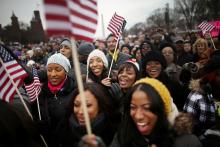
"Faith in America's Future" — that was the theme of Monday's inauguration activities.
Watching the prayers, the songs, the speeches, the crowd massed on the Washington Mall, I felt the faith. We don't have to hate each other. We can work together for a future that will be good for our country and for us as individuals. We can, as the President charged us to do, make the "values of life and liberty and the pursuit of happiness real for every American."
Inaugurations are times for setting aside differences and wildly celebrating. While Richard Blanco read his inaugural poem, even John Boehner looked teary-eyed.
The political divisions will be back in full force this week, of course. And yet we Americans are in the midst of some really big changes — changes that may make today's partisan squabbles look hopelessly antiquated in just a decade or two. Monday's events highlighted these changes.
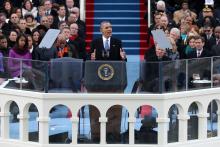
I attended the Inauguration Ceremony today. It was thankfully not as cold as last time. But it was one of President Barack Obama's best speeches — strong, clear, even tough, in a good way. My favorite line was: "… history tells us that while these truths may be self-evident, they’ve never been self-executing; that while freedom is a gift from God, it must be secured by His people here on Earth."
In other words, God has made those principles always presented at inaugurals "self-evident" or ordained; but human beings must implement them. The president is saying that it is up to us to do that in our time. He elaborated. He was specific.